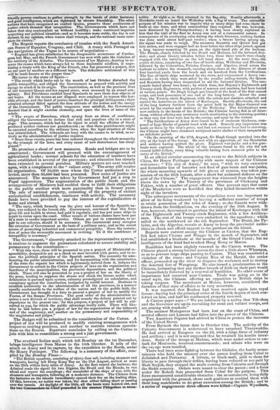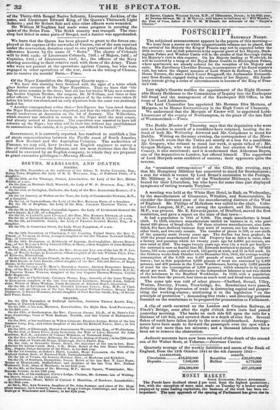The overland Indian mail, which left Bombay on the 1st
December, brings intelligence from Macao to the 10th October. It tells of the attack on Amoy and its capture, by the expedition to the North, under Sir Henry Pottinger. The following is a summary of the affair, compiled by the Bombay Times— "The British squadron, consisting of thirty-four sail, including steamers and transports, having left Hong Kong Bay on the 21st August, arrived at noon on the 25th within forty miles of Amoy. As the fleet neared the harbour, the Admiral made the signal for two frigates, the Druid and the Blonde, to run ahead and report the soundings ; the remainder of the ships of war, with the steamers and transports, following at a moderate distance. The Chinese from the batteries on the islands immediately opened their fire on the leading ships. Of this, however, no notice was taken, the shot either falling short or passing over the vessels. At daylight of the 26th, all the boats were hoisted out, and the two Commanders-in-Chief proceeded in the steamer Phlegethon to recon noitre. At eight a. m. they returned to the flag-ship. Shortly afterwards, a Mandarin came on board the Wellesley with a flag of trace. 'The ostensible
purpose of his mission was to inquire why so many ships had come there to
trade at one time, and what commodities they required. He was, however, soon dismissed by the Plenipotentiary ; it having been clearly explained to
him that the visit of the fleet to Amoy was not of a commercial nature. In consequence of its continuing calm during the whole forenoon, nothing further was done until about half-past twelve ; when a breeze having sprung up,
the signal was made to weigh. The steamers Sesostris and Queen first got into action, and were engaged half an hour before the other ships joined, against a long battery mounting 76 guns, on the right-hand side of the harbour. The Blonde, closely followed by the Druid and Modesto, led the larboard division; and about twenty minutes before two, these three vessels were closely engaged with the batteries on the left hand shore. At the same time, the centre division, consisting of two line-of-battle ships, Wellesley and Blenheim, followed by the Columbine, Pylades, Cruiser, and Algerine, stood across the harbour to relieve the steamers, running along-shore at the distance of about four hundred yards from the beach stud six hundred from the fortifications. The line-of-battle ships anchored by the stern, and commenced a heavy cannonade; in which they were aided by the smaller sailing-vessels, the Queen and Sesostris having been despatched to aid the larboard division. The cannonade lasted about two hours; by which time, her Majesty's Eighteenth and Twenty-sixth Regiments, with parties of seamen and marines, had been landed at various points. Sir Hugh Gough put himself at the head of the first-named corps, and took possession of one end of the long battery. About the same time, the Twenty-sixth Regiment, with the sailors and marines, attacked and carried the batteries on the island of Koolangsu. Shortly afterwards, the end of the long battery furthest from the point held by the Major-General was seized by the seamen and marines of the Wellesley. The fortifications were now entirely in the hands of the British ; the Chinese having fled in all directions, without offering any resistauce worth mentioning to the storming-parties; so that very few lives were lost by the enemy, and none by the victors. "The fortifications of Amoy were found to be of immense thickness, composed of huge blocks of granite faced with mud. Scarcely any impression was made on them by the ship's guns; and had not recourse been had to storming, the Chinese might have remained uninjured under shelter of their ramparts for an indefinite period. "On the morning of the 27th August, Sir Hugh Gough marched into the city at the head of the troops. He met with no opposition, all the Mandarins and soldiers having quitted the place. Eighteen war-junks and a few gunboats were captured. The whole of the treasure found in the city did not exceed 5,000 dollars, every thing valuable having been removed prior to the entry of the British."
In an official circular announcing the event to the British subjects in China, Sir Henry Pottinger speaks with more respect of the Chinese resistance : " The city of Amoy," he says, " with its very extensive and formidable line of batteries and fleet of gun-boats and war-junks, the whole mounting upwards of 500 pieces of cannon, was taken possession of on the 26th instant, after a short but animated defence on the part of the Chinese." The engagement was witnessed from the heights above the town by the Viceroy of the provinces of Chekeang and Fokien, with a number of great officers. One account says that some of the Mandarins were so horrified that they killed themselves within sight of the invaders. The subsequent movements of the expedition were too important to allow of its being weakened by leaving a sufficient number of troops to retain possession of the town of Amoy ; so the Guards were withdrawn from the fortifications, on the evening of the 30th August. It was, however, determined to garrison the island of Koolangsu with 500 of the Eighteenth and Twenty-sixth Regiments, with a few Artillerymen. The rest of the troops were embarked in the squadron ; which sailed to the northward on the 5th September. The Druid, the Pylades, and the Algerine remain at Amoy to keep the provincial authorities in check and afford support to the garrison on the island. Reports were current among the Chinese at Canton, that the English had taken Chusan and Ningpo in the month of September, and had established a blockade at the mouths of the Grand Canal ; but no intelligence of the kind had reached Hong Kong or Macao.
Hostilities had been slightly renewed in the Canton waters. The Chinese placed a strong barrier across the river a little above Whampoa, so as to prevent large ships passing to Canton. That was considered a violation of the truce ; and Captain Nias of the Herald, the senior officer, proceeded up the river to disperse the workmen and to destroy the deserted fort of Wangtong. He also issued a proclamation to the Chinese, intimating that any further breach of faith on their part would be immediately followed by a renewal of hostilities. No other event of importance had occurred near Canton. Trade was going on in the usual style, the Chinese offering no opposition to British ships in taking cargoes. The merchants at Macao, however, considered the duration of that state of affairs to be very uncertain.
It was reported that Keshen had been received again into royal favour ; having had the principal order of the fourth degree of rank conferred on him, and half his confiscated property restored. A Canton paper says—" We are informed by a native that Yih-shan and the Governor are again recruiting for stout and valiant troops„and are arming with muskets."
The steamer Madagascar had been lost on the coast of China, and several officers and Lascars bad fallen into the power of the Chinese.
Two American frigates had arrived in China to protect the interests of the United States.
From Burmah the latest date is October 31st. The activity of the Calcutta Government is understood to have surprised Tharawaddie. He had arrived at Rangoon on the 2d, with a large force of infantry and artillery ; and it is not supposed that he retained his hostile intentions. Some of the troops at Madras, which were under orders to embark for Moulmein, received countermands; and others who were on the voyage were recalled. There had been some fighting between the Ghilzies, the hardy mountaineers who hold the mastery over the passes leading from Cabal to dellalabad and Peshawar. A tribute, or black-mail, paid to them for liberty to pass through their defiles, having been reduced or not paid by Shah Soojah, they stopped the mails coming from Calcutta and through the Siekh country. Orders were issued to clear the passes ; and a force under Sir Robert Sale proceeded from Cabal for the purpose. This force encountered considerable obstacles : the mountaineers, being fully acquainted with the ground, chose such positions as enabled them with their long matchlocks to do great execution among the British ; and in a series of engagements three officers were killed—Captain Wyndham, of the Thirty-fifth Bengal Native Infantry, Lieutenant Jenkins, of the same, and Lieutenant Edward Bing, of the Queen's Thirteenth Light infantry; and Sir Robert Sale and nine other officers were wounded.
Sir William M'Naghten had made some progress insecuring the quiet of the Bolan Pass. The Siekh country was tranquil. The ricecrop had failed in some parts of Bengal, and a famine was apprehended.



























 Previous page
Previous page